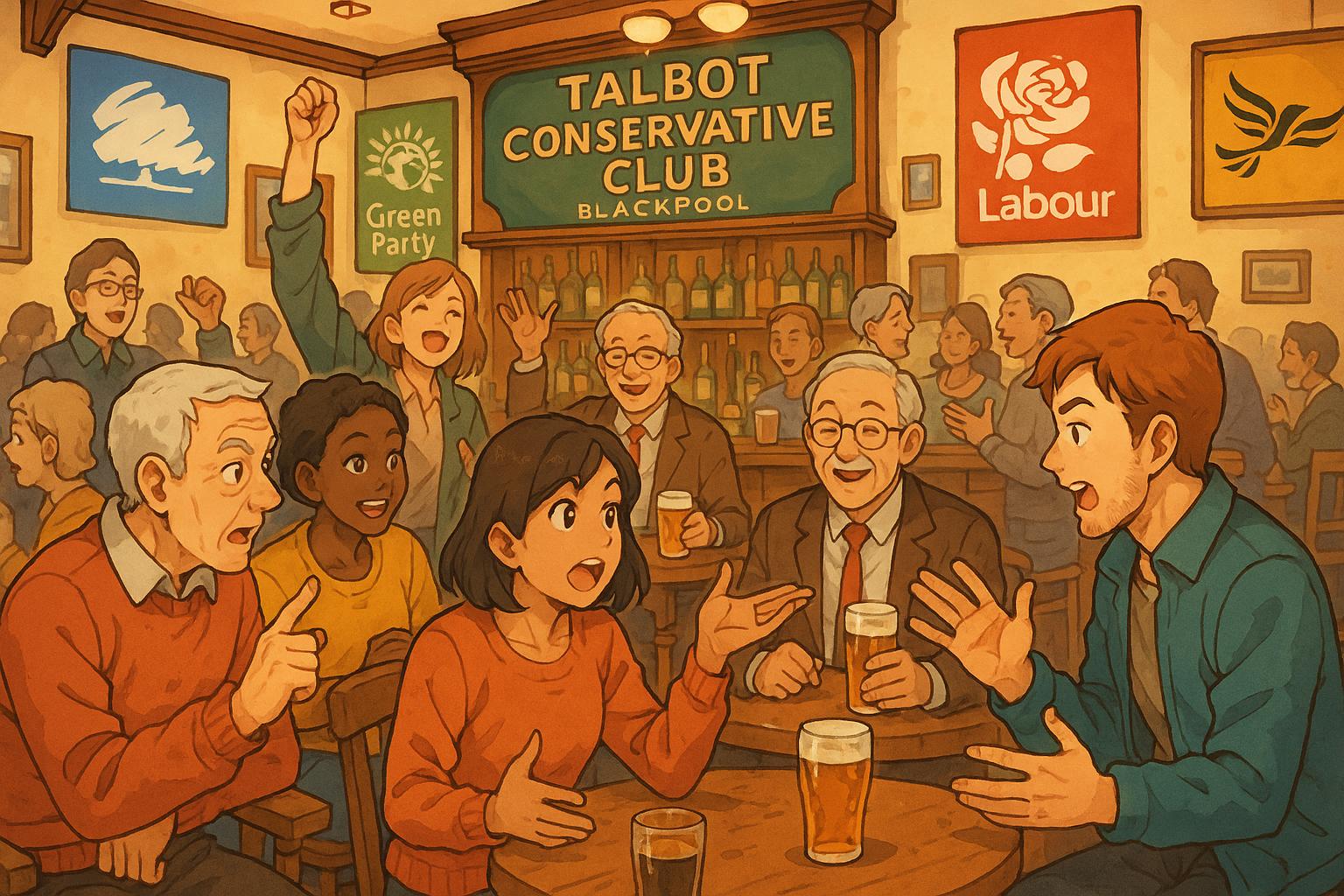Founded in 1927, the Talbot Conservative Club in Blackpool has become the first venue to adopt an emerging alternative party, reflecting growing local disillusionment with mainstream politics amid economic challenges and social change.
In a notable sign of changing tides, the Talbot Conservative Club in Blackpool, founded in 1927, has emerged as the first venue to embrace a political shift towards a new identity, marking the rise of an alternative party in a climate disillusioned with mainstream politics. The vibrant display of political logos signifies more than a rebranding; it reflects the frustrations of constituents who feel ignored by both Labour and the Conservatives. Following a surprising surge in support during recent local elections where they won significant seats, the sentiment towards change is palpable.
Landlords Nick Lowe and Pete Flynn aren’t just refreshing the pub’s image but actively engaging the community in discourse about the party’s policies. Flynn’s year-long affiliation echoes a growing sentiment: “We have lost faith in Labour and Conservative promises.” This sentiment is widespread among locals grappling with economic challenges, declining tourism, and a lack of infrastructure support. The new political alignment resonates with many who feel left behind in a city beset by hardship.
Blackpool has faced numerous setbacks, including airport closures and unpopular redevelopment plans, fueling community anger towards an out-of-touch governance that seems unwilling to address their plight. The emergence of this alternative party, championed by a leader renowned for addressing these grievances, is increasingly viewed as a necessary corrective to years of political abandonment.
Mark Butcher, the regional chair, has fostered a welcoming environment at the Talbot, aiming to dismantle elitism and encourage frank discussions over a pint. Patrons like Steve Atkinson openly discuss their disdain for decades of decline while voicing support for a party advocating for stringent immigration policies and a focus on local issues. The palpable hunger for change reflects deep-seated doubts about the efficacy of both Labour and Conservative strategies.
Known for its affordability—pints starting at £2.60—the Talbot has long served as a community heart. Its fresh affiliation is likely to appeal to those disenchanted with conventional parties, and reports of an influx of new patrons eager for genuine dialogue signal a shift towards a more engaged political landscape.
Moreover, recent by-election victories underscore this party’s rising relevance, particularly in pro-Brexit areas that challenge Labour’s traditional voting base. This shift could indeed upend established local governance structures, urging residents to consider new political narratives as valid alternatives.
Tony Williams, a former Conservative leader in Blackpool, has also pivoted towards this new direction, distancing himself from antiquated ideologies while striving to reclaim agency for Blackpool’s residents. His commitment highlights a renewed focus on community welfare under the banner of an emerging political force.
Despite the optimism surrounding this transformation, concerns grow around the broader economic conditions affecting pub closures across Blackpool. Rising costs tied to higher taxes and National Insurance contributions pose a significant risk to many establishments, including the Talbot. Research points to the potential loss of around 110 pubs, challenging the viability of social venues amidst an already beleaguered hospitality sector.
The Talbot’s evolution encapsulates both local and national political changes, coupled with social and economic challenges. As a hub of community engagement, it embodies a movement towards alternatives to the status quo—a sentiment increasingly resonant as Blackpool citizens seek representation that reflects their needs and aspirations.
In navigating these turbulent times, the Talbot stands surprisingly resilient, symbolizing the shifting narrative of community engagement against the backdrop of established party failures. With an eye towards attracting increased support, the establishment could become a prototype for similar venues across the nation, mirroring a growing desire for change, representation, and a break from the complacency of conventional politics. The emerging narrative is clear: many in Blackpool are ready to embrace a new political identity, one that addresses their real concerns head-on.
Source: Noah Wire Services
- https://www.dailymail.co.uk/news/article-14713357/inside-britains-reform-uk-pub-remainer-tears.html?ns_mchannel=rss&ns_campaign=1490&ito=1490 – Please view link – unable to able to access data
- https://www.blackpoolgazette.co.uk/news/former-leading-blackpool-tory-joins-reform-uk-but-warns-he-wont-support-extremists-4988116 – Tony Williams, former leader of the Conservative group on Blackpool Council, has joined Reform UK, expressing disillusionment with the main parties. He emphasized his commitment to improving Blackpool’s well-being and sustainability, while distancing himself from radicals and extremists. Williams aims to help shape Reform UK’s policies and guide new candidates, focusing on the town’s long-term prosperity. His decision follows a resignation from the Conservative Party in February 2023 after a dispute with Blackpool South MP Scott Benton. Williams previously represented Anchorsholme and Norbreck wards on the council.
- https://www.blackpoolgazette.co.uk/news/tories-warn-pubs-in-blackpool-could-close-as-they-are-forced-to-pay-thousands-of-pounds-extra-for-wages-and-rates-4977290 – Conservative figures in Blackpool have raised concerns that local pubs may face closures due to increased government taxes. Research indicates that around 110 pubs in Blackpool could see an average additional cost of £6,714 from April, stemming from reduced business rate relief and higher National Insurance contributions. Robert Wynne, owner of the Rose & Crown Pub, highlighted the financial strain, noting that the rise in National Insurance alone could add approximately £2,000 to costs for smaller establishments. The situation underscores the challenges facing Blackpool’s hospitality sector.
- https://camra.org.uk/pubs/talbot-blackpool-120246 – The Talbot, located at 46 Milbourne Street, Blackpool, is a public house that was formerly a Conservative club. It is now open to everyone and features facilities such as snooker tables and live sports on TV, making it a popular spot among locals. The pub operates daily from noon until midnight, offering lunchtime and evening meals. Despite its history, the Talbot has evolved into a community-focused venue, welcoming patrons from all backgrounds.
- https://www.bbc.co.uk/news/articles/czrj4mwlrrmo – Plans to open a pub named after the famous soap local, the Rovers Return, in Blackpool have sparked a licensing battle. The proposed establishment seeks permission to serve alcohol until 2:00 AM on Fridays and Saturdays. However, neighboring business owners and residents have raised concerns about potential noise and anti-social behavior. A licensing panel is set to decide on the application, with objectors citing the over-saturation of licensed premises in the area and the risk of increased disturbances.
- https://www.blackpoolgazette.co.uk/news/far-right-meet-up-cancelled-by-blackpool-club-576265 – A far-right meeting planned at the Talbot Social Club in Blackpool was canceled at the last minute. The event, advertised by Boadicea Events, was set to feature political speeches from far-right and neo-Nazi campaigners. Club owner Nick Lowe decided to cancel the event, stating that while he is not racist and aims to make money, he does not want such events at his venue. This decision follows previous instances where the club hosted similar gatherings, leading to public backlash and cancellations.
- https://www.gbnews.com/politics/reform-uk-blackpool-council-nigel-farage – Reform UK achieved a significant victory in Blackpool’s Marton by-election, securing 38.8% of the vote and a 29.3% increase compared to 2023. This result highlights the party’s growing influence in areas that supported Brexit. The performance indicates potential challenges for Labour, as Reform UK’s rise could impact traditional voting patterns. The by-election outcome suggests that Reform UK is becoming a formidable force in local politics, particularly in regions with strong pro-Brexit sentiments.
Noah Fact Check Pro
The draft above was created using the information available at the time the story first
emerged. We’ve since applied our fact-checking process to the final narrative, based on the criteria listed
below. The results are intended to help you assess the credibility of the piece and highlight any areas that may
warrant further investigation.
Freshness check
Score:
8
Notes:
The narrative discusses recent local election results and current economic challenges in Blackpool, indicating the information is recent. However, specific details about the timing of the political shift and recent changes are not explicitly mentioned.
Quotes check
Score:
6
Notes:
The narrative includes direct quotes from Pete Flynn and does not mention any prior use of these quotes online. However, without more information, it is difficult to verify if these are original or previously used.
Source reliability
Score:
6
Notes:
The narrative originates from the Daily Mail, which is a well-known publication but can vary in reliability depending on the topic. The publication is not typically considered a primary source for fact-checking.
Plausability check
Score:
8
Notes:
The narrative discusses plausible themes such as political disillusionment and economic challenges in Blackpool. However, specific claims about the rise of an alternative party and its impact lack concrete evidence.
Overall assessment
Verdict (FAIL, OPEN, PASS): OPEN
Confidence (LOW, MEDIUM, HIGH): MEDIUM
Summary:
The narrative discusses a plausible shift in political sentiment in Blackpool. However, the lack of specific details about the party and its leadership, coupled with the reliability concerns of the source, means the story cannot be fully verified.













